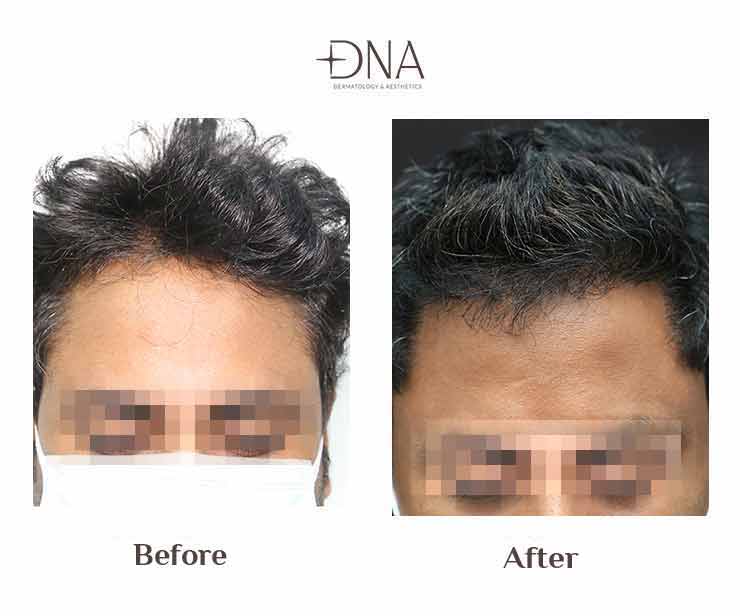Hair Transplant: Basic Things One Should Know
Hair transplants are intended to promote new hair growth in bald or sparsely covered areas of the scalp. Although they effectively treat several hair loss disorders, they do not stop additional hair loss. People might need additional touch-ups to achieve long-lasting results.
In addition to being a natural part of aging, a medical condition or damage to the scalp can also cause hair loss and thinning. A hair transplant may be chosen by individuals with hair loss for reconstructive or cosmetic purposes.
The hair specialist of a leading clinic, DNA Clinic, renowned for offering the best Hair Transplant in Bangalore, has addressed the various facets of hair transplant treatments in this article. It is necessary to have fundamental knowledge before going for a procedure, and the information presented in this article will assist one with the same.
What is a Hair Transplant?
In a hair transplant, healthy hair follicles are transferred from one area of the scalp—typically the back or sides of the head—to a balding area.
The technique is intended to treat hair loss caused by an injury or an uncommon condition, as well as hair loss that is hereditary and hormonal in nature. Many individuals discover that getting a hair transplant can help them look younger again, improving their self-confidence and general well-being.
An experienced surgeon should only carry out a hair transplant. Before the treatment begins, one will typically receive local anesthesia to ensure that one won't experience any pain. Follicular unit excision (FUE) and follicular unit transplantation (FUT) are the two most used techniques for hair transplantation.
Who Can Benefit from Hair Transplants?
Getting a hair transplant can boost one’s confidence and looks. Ideal candidates for hair transplants include:
Male pattern baldness sufferers
Women whose hair are thinning
Anyone who has experienced a burn or scalp injury and experienced hair loss
Who Should Not Get a Hair Transplant?
Hair transplants are a bad idea for:
Females whose scalp hair loss has a widespread pattern
Individuals who lack enough hair which can be used as donor hair
Individuals who experience hair loss as a result of chemotherapy
Those who have keloid scars (thick, fibrous scars) after surgery or injury.
What Precautions Should be Taken After Hair Transplant?
DOs:
One should take the medicines as prescribed by the doctor.
Regularly mist saline water over the hair that has been transplanted.
Start with easy workouts, being careful not to put pressure on the scalp.
Shield the head from heat, dust, and sunlight, wear a surgical cap for at least three weeks.
DON'Ts:
Refrain from drinking alcohol for the first two days following surgery.
For a few weeks, refrain from washing the transplanted hair with tap water.
For the first five days, avoid leaning downward to avoid any swelling.
Don't use a hair dryer.
Avoid rubbing the newly-placed hair.
Don’t use a comb to comb the transplanted hair.
Use only the shampoo suggested by the doctor.
Use the medication that the doctor advises.
For at least 14 days, refrain from using steam.
Cost of Hair Transplants
A hair transplant is a bit more expensive when compared to other non-surgical hair restoration methods or a hairpiece. However, because the benefits are long-lasting and the transplanted hair grows nicely, getting this surgery is a great decision. During the consultation, one can discuss the surgeon about the cost of the hair transplant.
The price will vary depending on a variety of variables, including:
Procedure's complexity
Surgeon's experience level
Chosen technique
Area to be treated
Number of grafts
Number of sessions
The number of hair transplant sessions depends on the following:
Region of the scalp that needs to be covered
Desired hair density
Patient's traits, such as hair type (coarse or fine)
Quantity and size of grafts used
Does Getting a Hair Transplant Hurt?
A hair transplant is not uncomfortable. While one could feel a little pressure or movement during the process, it shouldn't be uncomfortable because the area to be treated will be numbed with local anesthesia before the procedure.
Doctor’s Note
For individuals with hair loss and thinning hair, hair transplant surgery is a good option. It frequently helps individuals regain their self-confidence by getting a head full of hair. To help the patient set realistic expectations for the hair transplant, the professional doctor will give a more understandable and reachable plan. Therefore, it is always advisable to seek the advice of a hair transplant specialist.
Visit DNA Skin Clinic, the premier hair transplant facility, if one wants an effective hair transplant. The clinic, run by the best Dermatologist in Bangalore, Dr. Priyanka Reddy, is also widely known for providing advanced treatment for various skin conditions, including acne, pigmentation, keloids, psoriasis, and more.


Comments
Post a Comment